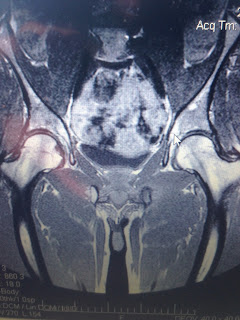Why am I writing about this now? Well, if you follow me on Twitter or Strava you may know that I've been having some pain in my butt/groin/hip. Back story: in 2014 I broke my hip (stress fracture) while running the Boston marathon. It happened towards the end (near the Citgo sign) and I managed to finish the race. After stopping, I could barely walk! Below, the first MRI has an arrow showing the location of my 2014 stress fracture. The second MRI is zoomed in a little closer so you can see the fracture.
After about 6 months of low/no impact training I was able to resume running. I knew I needed to be more careful with my training and one of my 2015 goals was to avoid injury. Fast forward to today, the summer of 2015, and I'm training for a summer ultra marathon, The Pinellas Trail Challenge. Obviously, the heat has made it difficult to run but I've adopted running considerable slower than I used to. My easy runs are easy, rather than the moderate effort I used to run most miles at. I've enjoyed running more and my volume increased quite rapidly. Too rapidly for me. I know my orthopedic threshold is lower than I'd like but I've been ignoring that fact; I needed (wanted!) to train for my upcoming race!
Unlike my 2014 stress fracture that occurred suddenly with acute pain, my injury now feels relatively minor. I hope it’s not another one! However, the feeling is disturbingly similar to my 2014 stress fracture. When I first felt it last week, I took two days off then, on the third day, ran an easy 11 (see the video I made on that run below).
The discomfort was still there. Ugh! WHY IS IT SO HARD TO JUST STOP? Well, I've stopped now and it's not pleasant but I'm happy; I know I need it! I'm writing this during a two hour sesh on the elliptical. I am taking a whole week off from running before I reassess. Saturday August 8th will be the soonest I run. I have to identify a date in here because it, and my readers (all three of you (LOL)) will hold me accountable. If there is any pain I will hold off for longer and, if necessary, cancel my race (I REALLY don't want to do that!).
So...something to take away...hmmm. Although I am self coached, I see incredible value in getting one. She will give you structure to your training and workouts tailored to your individual abilities/needs. If you adhere to the plan, I think you'll be less likely to become injured. I also see incredible value in the running community, especially online; you can communicate with thousands of people and see what they're doing. Moreover, the running community provides support when you're doubting your own training. Although we think we know best, sometimes it helps hammer home an idea when you hear about and see others doing what you know to be best.
Many thanks to my wife and running peeps for what you do. You don’t know how much I value what you provide!


